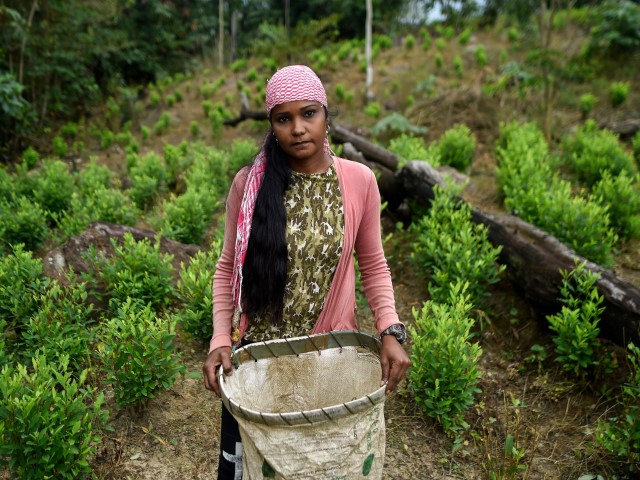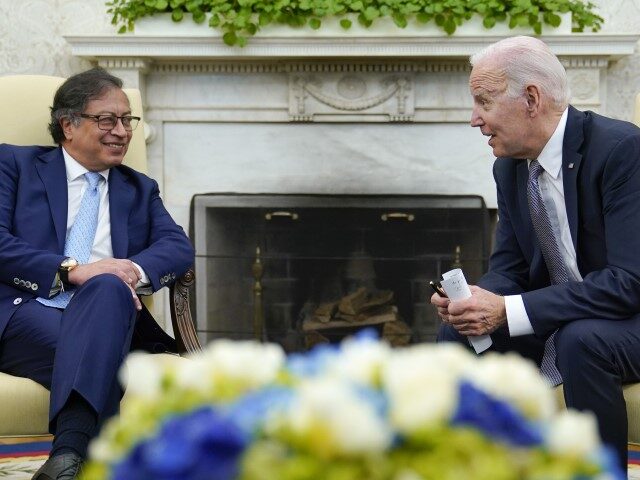Colombian President Gustavo Petro told reporters on Thursday that his leftist American counterpart Joe Biden is “interested” in a scheme to pressure the International Monetary Fund (IMF) and other global banking institutions to offer debt relief to countries that promise to invest in fighting the “climate crisis.”
Petro spent much of the week in Washington, DC, for engagements with the Organization of American States (OAS) and other bodies in addition to meeting with Biden. During his address to the OAS, Petro openly boasted of his former membership in the Marxist Colombian militia M-19, stating that Latin Americans – “and I, personally” – responded to military junta governments in the region in the 1970s with “armed insurgency, with revolutionary wars, with revolutions.” M-19 is named after an election in Colombia on April 19, 1970, that the radical left deemed fraudulent. Petro addressed the OAS on that date, which is also his own birthday.
“Well, it’s very difficult turning 40 years of age,” Biden joked while congratulating the newly 63-year-old Petro the next day.
The office of the presidency of Colombia noted that, in addition to their easy rapport, the two heads of state agreed on radical progressive proposals on several issues, focusing much of their discussion in the White House on the alleged “climate crisis.”
Speaking to reporters after the event, Petro stated that Biden “identified with the proposal of debt relief around the world in exchange for climate action.”
“They [the U.S. government] said they were very interested in taking to the IMF the proposal and turning it into reality, which would be a very important transformation in the world: the exchange of public debt for climate action.”
Petro, who was inaugurated as president of Colombia nearly a year ago, campaigned on turning climate action into a priority and has for years advocated for wealth redistribution from wealthy, high-emissions countries to poorer nations at the forefront of the “climate crisis.” During his inauguration, Petro raised the issue of climate wealth redistribution, proposing the plan he brought to Biden – “exchange external debt for internal expenses to save and recover our jungles, forests, and wetlands” – as a form of climate justice.
Petro’s vice president, Francia Márquez, demanded before the U.N. that international financial institutions cancel foreign debt; rather than a climate proposal, Márquez described the proposal in December as a “path of historical reparation for the Afro-descendant population.”

Gustavo Petro, Colombia’s president, left, hugs Francia Marquez, Colombia’s vice president, during an inauguration ceremony at Plaza Bolivar in Bogota, Colombia, on Sunday, Aug. 7, 2022. Colombia’s first leftist president starts his four-year term on Sunday, inheriting shaky public finances that will make it tough for him to deliver the lavish social programs his supporters expect. (Nathalia Angarita/Bloomberg via Getty Images)
Biden did not address Petro’s debt relief proposal during his brief remarks alongside the Colombian president prior to their closed-door meeting. He did announce that his administration had committed $500 million “to deal with preserving the Amazon” rainforest in Colombia. The presidents’ joint statement after the meeting also did not mention debt relief, but heavily emphasized climate change policy.
“President Biden and President Petro expressed unwavering commitment to combat the climate crisis, a real threat facing the world,” the statement emphasized.
“The United States is the largest international supporter of climate action in Colombia with $87 million in environmental programming provided during the last two years and the President’s $45 million Fiscal Year 2024 budget request to Congress,” the statement continued.
It gave further details:
With Colombia’s announcement to allocate US$200 million during the next twenty years to save and protect the Amazon, the United States and Colombia we [sic] committed to work with the international community to mobilize greater climate financing for that purpose.
The two presidents also claimed they had “committed to take measures to accelerate the clean energy transition, decarbonize our economies, and promote renewable energy sources that will allow us to lay the foundations for an inclusive and fair economy.”
Biden and Petro also discussed drug trafficking, a growing problem under Petro exacerbated by his pro-cocaine policies. Petro has repeatedly and publicly defended cocaine as a drug, calling it less deadly than fossil fuels, and condemned before the United Nations General Assembly last year governments that decree “cocaine is the poison and must be persecuted … but, instead, coal and oil must be protected, even if their use can extinguish all mankind.”
Rather than combat coca cultivation in his country, Petro has proposed a “total peace” plan that targets cocaine shipments but deemphasizes the eradication of coca crops or targeting of farmers.

Naikelly Delgado, 36, a Venezuelan migrant working as a “Raspachin” (farmer collector of coca leaves), poses for a picture at a coca plantation in the Catatumbo region, Norte de Santander Department, in Colombia, on February 9, 2019. Many Venezuelan who fled their country stopped being workers, taxi drivers, fishermen or sellers to collect the leaf that is used to make cocaine, an illegal activity that they had barely heard about and that tears them physically and morally. (LUIS ROBAYO/AFP via Getty Images)
“I think it was understood well that it’s one thing to fumigate a plant or some human beings, who are economically weak, and another thing to pursue the corporate body of drug trafficking,” Petro said after his meeting with Biden, “which is done through intelligence labor, through assets, through money, and is done through interdiction.”
Petro said that he requested that Washington offer more “vessels, more ships, more drones” to spot and interdict drug shipments.
Biden expressed support for Petro’s “holistic” approach to drug trafficking in the joint statement.
“President Biden and President Petro committed to a holistic approach to address the harmful impacts of drug use and drug trafficking,” the statement read. “We will redouble our efforts in terms of demand reduction through science-based prevention, harm reduction, treatment, and recovery support.”
“Likewise, the leaders instructed their teams to intensify and expand bilateral cooperation in intelligence and interdiction to dismantle the networks, pursue the true owners and enablers of drug trafficking in their jurisdictions, and counter illicit finance,” the presidents concluded.

COMMENTS
Please let us know if you're having issues with commenting.